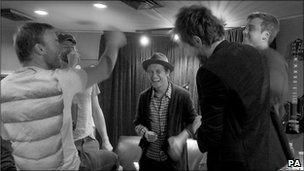Take That progress: Robbie shines but Gary's in charge
- Published

All the songwriting on Progress is credited to Take That
Robbie Williams says he left Take That because his attempts to become a more creative member of the band were thwarted.
Fifteen years later, and with sales of 57 million solo records behind him, he's finally been given his chance on Progress.
The Flood, the opening track from the man band's first album as a reunited five-piece, begins with lush strings as Williams belts out: "Standing on the edge of forever, at the start of whatever."
It's a beginning that would sit well on any Williams solo album from 2000's Sing When You're Winning onwards.
Not to be outdone, Gary Barlow stamps his mark with a trademark rising middle eight heralding a chorus that owes much to four-piece 2005-2009 Take That.
It offers a tantalising glimpse of the best of both worlds.
But Progress' first single is not typical of the album. While Robbie's input feels like an extension of his solo material, contributions from Gary, Mark and the other two are distinctly different from their last two releases, Beautiful World and the Circus.
Don't expect a Patience, Rule The World or Greatest Day. Take That mark three - as the album title suggests - is all about reinvention.
Thanks to the album's producer, Madonna collaborator Stuart Price, it's electro-tinged reinvention.
On paper, an electrofied Take That shouldn't work. But Price's fusion of chugging synth lines, a mixture of synthesized and real drums, and subtle harmonies pushes things forward.
Williams wordplay brings another dimension throughout - Barlow would never have written "we'll be practising our politics, defending all our policies, preparing for apocalypse", from possible single SOS.
This is the album Rudebox - Williams' disappointing 2006 sonic experiment - could have been.
Ballad-free zone
But while Progress is likely to be lauded by critics, Take That are steering a brave, new course given Rudebox's alienation of the core Williams audience.
Female pop fans in their late 30s/early 40s are not necessarily the biggest fans of electro-rock.
Those same fans will be wondering why they can't find a Barlow ballad.
Wait, with its opening piano and high, cinematic strings, threatens to be just that before an electronic breakbeat unexpectedly kicks in.
The closest we get to a Barlow epic is Eight Letters - "when I went away, what I forgot to say, was all I had to say, eight words, three words, one meaning". But even here, the usual opening piano chords are replaced with a distorted solo synth.
Kidz, featuring Owen in the verse and a heavily-processed Williams in the chorus, is a definite contender for second single, sounding as it does like a cross between Sam Sparro's Black and Gold, and Feel Good Inc by Damon Albarn's Gorillaz.
It faces strong competition from Happy Now which, along with The Flood and delicate duet Pretty Things, features Barlow and Williams on lead vocals.
The harmony-drenched chorus of "I feel myself falling, I'm feeling happy now" is the only moment reminiscent of five-piece 1990s Take That - think Everything Changes 2010.
It's also the most uplifting moment. Williams' return to the fold has brought a moodier edge to Take That's usually breezy sound.
Mark Owen, meanwhile - making a pitch to become Take That's George Harrison - performs admirably on his songs, SOS and What Do You Want From Me?

Feeling happy now: But Williams' return has brought a moodier edge to the music
Both sound like The Killers - whose last album Day & Age was produced by one Stuart Price - particularly Owen's Mr Brightside-alike What Do You Want From Me?
Howard Donald gets his moment on the super-high, super-fast Affirmation while, in Jason Orange's hidden track Flower Bed, Price creates a shimmering wall of sound.
Williams' vocals are the most prominent on Progress and, on the surface, it's the first Take That album not dominated by Barlow.
But don't be fooled. Williams now calls his former nemesis "the captain" while Barlow has confirmed he "still leads the trail".
His musical input into this album, as with all Take That releases, is vast.
For all the progress made in the latest gear change of the Take That rollercoaster, Gary Barlow is still the leader of the band that was formed around him.
Progress is released in the UK on Monday.
- Published31 October 2010